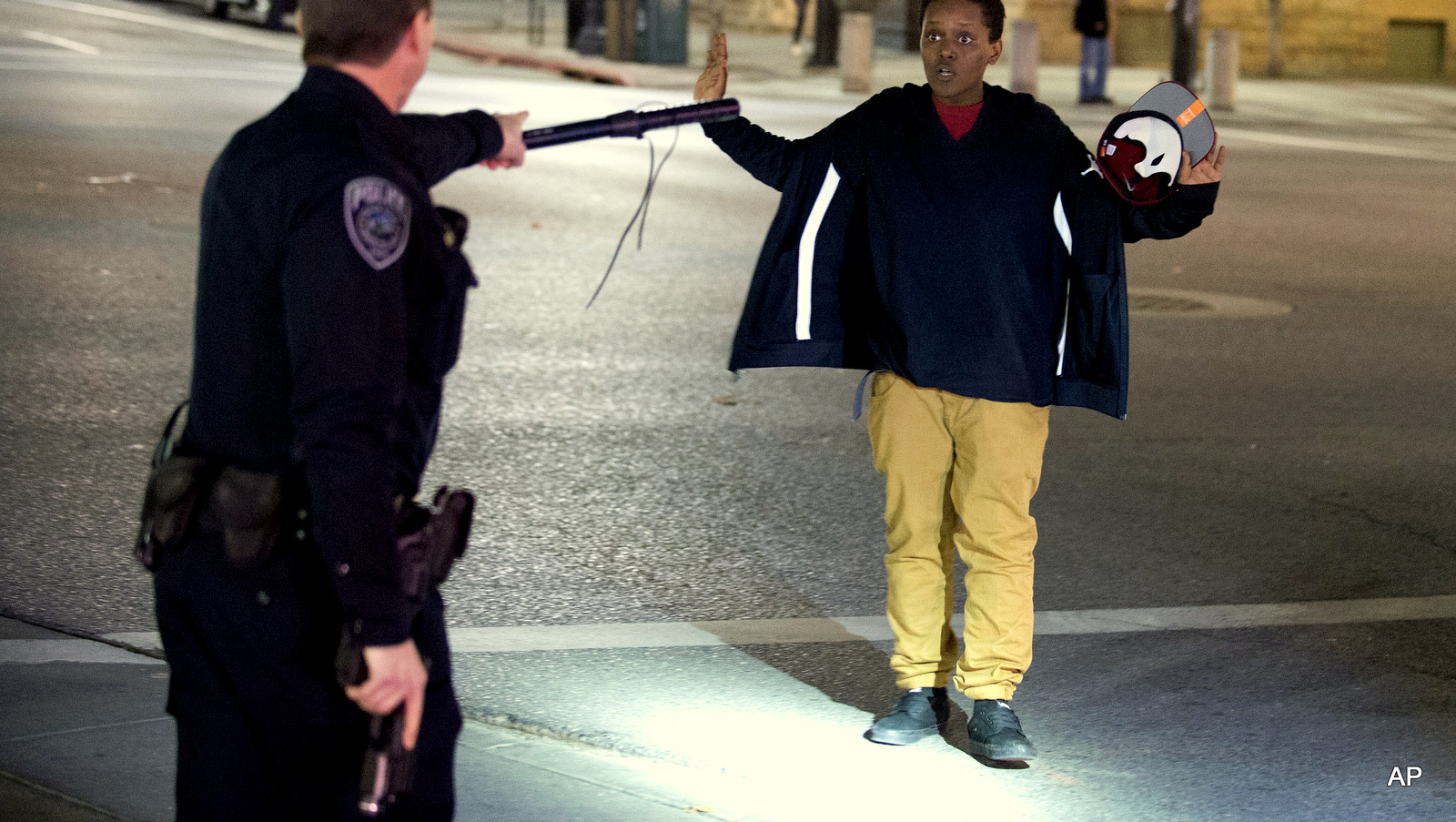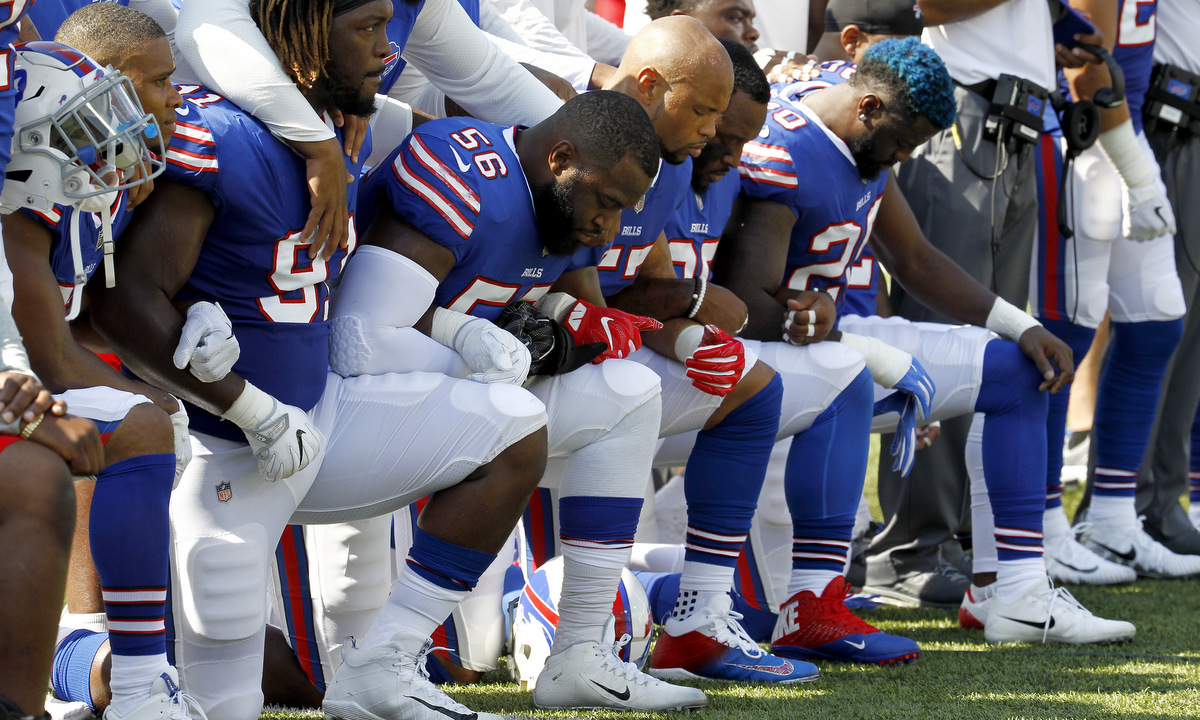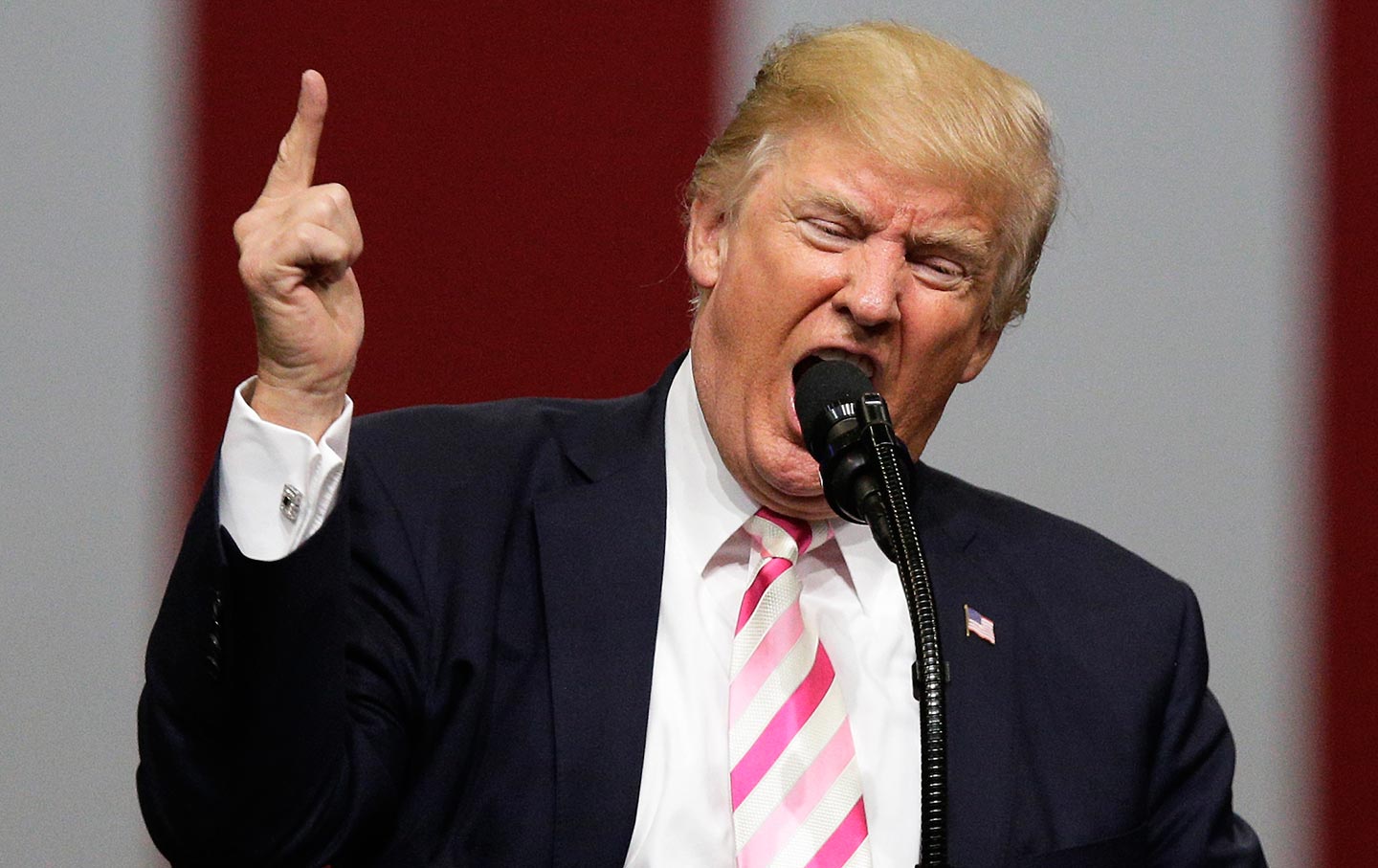American football quarterback Colin Kaepernick exploded across national headlines in 2016 for his evolving, bended-knee protest against systemic racism and police brutality. Kneeling during the national anthem became a rallying point for athletes not just in professional football but in other sports and at other levels, including among high school students. For his defiance, Kaepernick found himself on the receiving end of death threats and physical violence from football fans who were all demanding the same thing, that he “stand up and shut up.”
Such cleaving to patriotism and the lock-step gestures of nationalism — from flag waving to pledging allegiance as early on as primary school — would be considered by many to be the hallmark of state indoctrination, should that state be anything other than the U.S. or one of its allies.
Related | Pat Boone, Why Do You Hate America’s Freedom?
By refusing to acknowledge the authenticity of Kaepernick’s resistance — indeed by twisting its plea for fair and decent treatment of all Americans into a fictionalized disrespect for flag, soldiers, and authority — millions of hyper-vocal Americans are making the U.S. the very caricature of chauvinism and intolerance they fantasize the outside world to be.
While mocking cults of personality emblematic of “regimes” led by a cartoonishly evil “Dear Leader,” their belligerent expressions of devotion to the U.S. flag, and the cult of Donald Trump, are frightening reminders of the fragility of democracy and civil society.
When police kill Black Americans, indictments are rare, convictions rarer still


Police stop a person as he walks away from a crowd that formed after an officer-involved shooting at on South Rio Grande Street in Salt Lake City. Salt Lake County District Attorney Sim Gill said officers acted appropriately when they fired at Abdullahi “Abdi” Mohamed because police believed he was about to seriously injure or kill a man with a metal broom handle.
Less than a minute before Jason Stockley shot Anthony Lamar Smith to death, he was recorded on dashboard camera saying he was “going to kill this motherfucker. Don’t you know it.” And that’s exactly what Stockley did.
In 2011, Stockley, then a St. Louis police officer, chased Smith after attempting to corner him near a fast-food parking lot over what he alleges was a drug deal. The 36-year-old Stockley, in pursuit of Smith, shot at him seven times with Stockley’s own AK-47, rather than his service weapon. Five of those bullets hit the 24-year-old Smith.
Prosecutors argued in court not only that the murder of Anthony Lamar Smith was premeditated, but that Stockley later planted a gun in order to justify killing Smith. Despite the evidence against him, Stockley, who had chosen to face a judge instead of a jury, was acquitted. After the verdict, downtown St. Louis erupted in protest, as members of the local community began to mourn another Black man slain, and another police officer facing no consequences for what was unquestionably a case of clear-cut murder.
Related | The Passion Of Colin Kaepernick
Despite there being an estimated 1,000 police shootings each year in the United States, convictions are very rare. Often, it’s only after organizers and family members bring attention to police killings, and push for national coverage, that the narrative goes beyond “officer-involved shooting” — a description used by media stenographers who do little more than parrot the dehumanizing language adopted by local police forces.
The victims of police violence, who are overwhelmingly Black, are forced to defend every fiber of their humanity, especially when it comes to proving why their loved ones did not deserve to die. Even in death, victims of police violence are turned into death-deserving criminals, thanks mostly to coverage from both corporate media and right-wing conspiracy hubs.
There are too many Americans who believe that drug offenses and even misdemeanors are deserving of a death sentence by way of a police officer’s service weapon. Anthony Lamar Smith should not have died that day, especially not at the hands of a police officer who rained bullets on him from his personal assault rifle — the words “I’m going to kill this motherfucker” spouting from his lips, as though he were hunting game.
The unquestionable racial component of state violence drives not only the initial police response but the path these incidents take within the legal system — whether indictments are sought, how diligently prosecuted, and to what legal end. Indictments are rare, convictions virtually nonexistent, justice consistently mocked.
Why Kaepernick and other athletes decided to kneel


Buffalo Bills players kneel during the national anthem prior to an NFL football game against the Denver Broncos, Sept. 24, 2017, in Orchard Park, N.Y. (AP/Jeffrey T. Barnes)
Colin Kaepernick had seen enough of racialized police violence, and decided to use his position as a public sports figure to transform his revulsion at this brutality into action. For a president or high public official, there are many options for impactful action; for an ordinary citizen, even a star athlete, very few. In August 2016 Kaepernick explained that things needed to change in America, and that’s why he had to turn to resistance against one of the most beloved American pastimes: nationalist expression and exceptionalism — the idea that if something happens in America, under color of the American flag, it must be right.
Members of the Santa Clara, California police union were so unsettled by Kaepernick’s unwavering resistance, and his statements on police brutality, that they threatened to stop working 49ers home games — characterizing his comments as “harassing behavior,” and demanding that he apologize.
As recent events prove, this authoritarian temperament is not isolated to police unions (some of whom indeed have supported Kaepernick’s right to protest), or even sports fans. President Donald Trump has now joined the chorus of American “patriots” demanding that players, specifically Black players, do as they’re told or lose their jobs. This sentiment is an expression of ownership, as though players exist solely to fulfil their duties on the field. Their human to human solidarity with members of a chronically victimized caste of their countrymen is as if of no account.
Trump discovers a new way to divide America


Trump speaks at a campaign rally in support of Senator Luther Strange in Huntsville, Alabama, on September 22, 2017. (AP/Brynn Anderson)
In front of a roaring and overwhelmingly White crowd, Donald Trump stood behind a podium for an hour with the purpose of promoting the re-election of Senator Luther Johnson Strange III, but instead veered into a tirade against “those people” who were taking a knee during that national anthem.
Related | Patriots And Protesters Should Take A Knee For The Constitution
“Wouldn’t you love to see one of these N.F.L. owners, when somebody disrespects our flag, to say, ‘Get that son of a bitch off the field right now, out, he’s fired!’” Trump bellowed. “You know, some owner is going to do that. He’s gonna say, ‘That guy disrespects our flag, he’s fired.’ And that owner, they don’t know it. They don’t know it. They’re friends of mine, many of them. They don’t know it. They’ll be the most popular person, for a week. They’ll be the most popular person in the country.”
With Trump’s audience unsurprisingly receptive to his racialized, flag-wrapping rhetoric, a national storm began. Triggered in part by Golden State Warriors star Stephen Curry declining an invitation to the White House in order to express his call for “some change when it comes to what we tolerate in this country,” Trump decided to use the opportunity to vilify all players who were in any way actively involved in or supportive of protests. And, thanks to his “base’s” reflexive flag worship, Trump was able to inflame an already fraught situation — bringing, as is his wont, angry division and chaos in his wake, a chaos he apparently needs to thrive both personally and politically.
Kaepernick’s protest, and the surge of similar gestures by Black sports icons, and now many non-Black allies, is far from being new to the American landscape when it comes to highlighting racist human rights abuses.
From the 1968 Olympics’ Black Power salute by athletes John Carlos and Tommie Smith, to Martin Luther King Jr. bending down on one knee alongside those who would eventually march alongside him, these acts of defiance mark a powerful and yet unsettling reality: not only are Black people still being obliged to declare their humanity and call for an end to the state violence of which they have long been the target, but public sentiment is still deeply tinged with vile racism against them.
Kaepernick’s protest — which has helped activate a movement-within-a-movement for Black Lives, including the solidarity-promoting hashtag #TakeAKnee — is necessary. After all, there can be no change without a demand — and, in the case of Kaepernick and Black organizers around the country, their demands are for justice.
Top photo | President Donald Trump walks off the stage after he speaks at campaign rally in support of Sen. Luther Strange, Friday, Sept. 22, 2017, in Huntsville, Ala. (AP/Brynn Anderson)
<!–
–>
Source Article from http://www.mintpressnews.com/trump-attacks-protests-emblematic-american-freedom/232616/
Related posts:
Views: 0
 RSS Feed
RSS Feed

















 September 29th, 2017
September 29th, 2017  Awake Goy
Awake Goy 
 Posted in
Posted in  Tags:
Tags: 
















